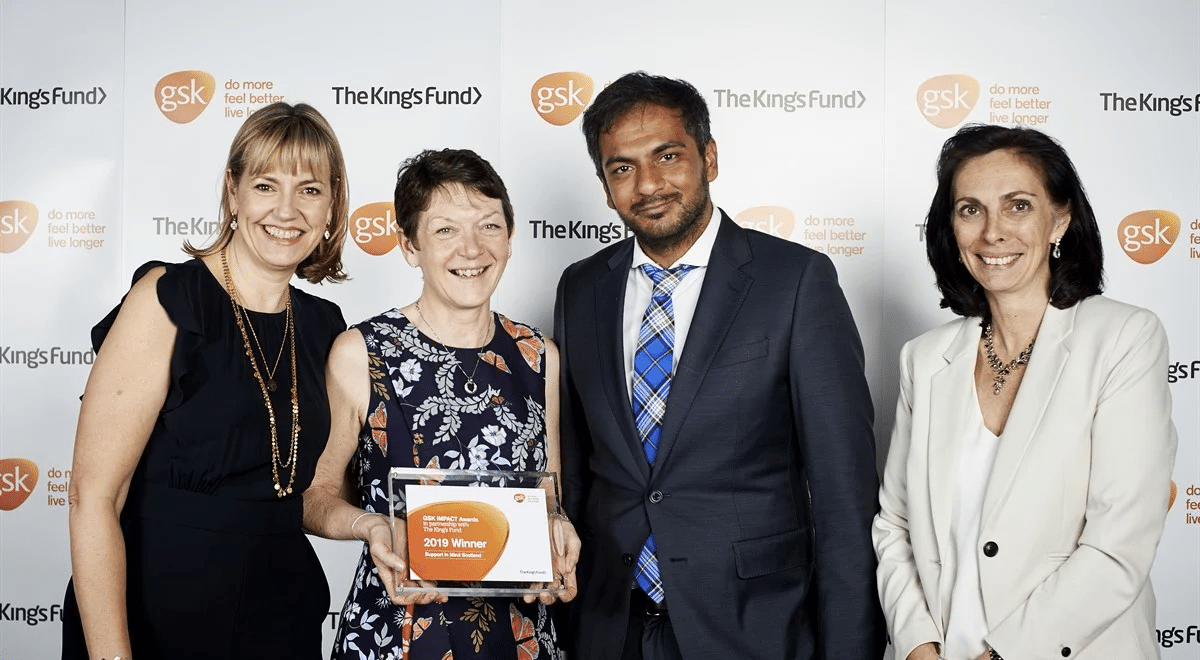Dr Max Ahmed is one of Compass’s Senior Research Scientists. He also chairs the Board of Directors for Support in Mind Scotland, a charity that helps people suffering with serious mental health challenges. We chatted to Max to find out more about the charity and why he wanted to get involved.
What does Support in Mind do?
Support in Mind Scotland is a mental health organisation that supports people with serious mental health challenges, like bipolar disorder and schizophrenia – conditions that tend to have a long-lasting impact on people’s lives. We want to make sure that nobody has to face mental ill health alone, including family, friends, and carers.
The nature of our support varies. We run around 21 local services throughout Scotland, from the Highlands and Islands to the Borders. These are places embedded in the local community that help those with mental health challenges, their families, and carers, integrate into society by providing a safe place for them to be themselves, meet others, and build confidence and social skills. We also raise awareness and tackle stigma through political engagement with local and national governments, using evidence based on the lived experience of the people who use our service. In this way, we aim to improve quality of life for people affected by mental ill health.
How did you become involved with Support in Mind?
Like most people who volunteer for a charity, I care deeply about the cause. I’ve had first-hand experience of caring for someone with profound mental health difficulties for the past 20 years and it’s not been easy. There are multiple, varied challenges in everything from accessing health and social care to a benefits system that is designed with physical rather than mental health in mind. Some of these challenges are so ingrained in everyday society that you can lose hope of ever seeing any change. I got involved with Support in Mind primarily to support the good work they do, advocating for change at both a local and national level. I joined the Board in 2017, and then became Chairman in 2018.
What is your role as Chairman of the Board?
The Board of Directors are responsible for the governance of Support in Mind. We set the direction and strategy, make sure that the charity is run effectively, and check that it’s meeting our purpose and objectives. We also have a responsibility for safeguarding – both financial safeguarding (making sure the money raised is used appropriately) and safeguarding the people we support, who are often very vulnerable.
There are 12 of us on the Board. We’re all volunteers from different backgrounds. What unites us is that we’ve all been personally affected by mental health challenges in some way. This makes us passionate but we have to be careful that we don’t let our passion influence our decisions, and we leave the operational side of running the charity to the staff whose job it is to do so.
As Chairman, I ensure that the Board operates to its fullest potential and support the CEO, acting as a link between the Board and staff. I ensure that decisions made by the Board are followed through.
Occasionally, I’m responsible for taking urgent action when it is not possible or practical to hold a Board meeting. An example of this was when the COVID-19 pandemic hit. It was a dynamic, fast-moving situation that required some significant decisions to be made quickly on how we best support some highly vulnerable people remotely.
On rare occasions, I dust off and squeeze into my suit and act as an ambassador for the organisation, promoting what we do and raising awareness of the problems we try to tackle.
Being Chairman is a lot of work, but it’s also been fun and interesting, and I’ve gained a lot from it – professionally and personally. It provides me with great insight and a much more holistic view of mental health and the challenges that people face, I think it complements my work at Compass very well. As a scientist, it usually takes years before you see the positive results of your actions (if at all!), whereas it’s been heartening to see the immediate impact Support in Mind has had.
Is there anything you’re particularly proud of helping Support in Mind achieve?
There’s a long list of things that I’m proud of over the past five years or so, but credit should most definitely go to the Support in Mind staff who work so hard. For example, we’ve launched a programme that aims to support frontline service providers, like police and paramedics, in looking after people suffering mental health distress. We are piloting a suicide bereavement support service in Scotland, and we’ve also launched a Mental Health Money Advice line. This was done in partnership with our sister charities in England, Northern Ireland and Wales, where we came together to form Mental Health UK – the only UK-wide mental health partnership.
If there is one thing I’m particularly proud of, it’s winning the 2019 GSK-IMPACT Award for our outstanding contribution to improving the UK’s health and wellbeing. The award is run by The King’s Fund, a national think tank that focuses on health and social care. It provided some well-earned recognition for everyone involved with Support in Mind Scotland and the work that we do.

